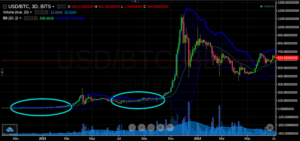What is the bitcoin halving and its significance to bitcoin price?
The halving is a time when the bitcoin mining rewards are cut in half. Right now miners solve blocks every 10 minutes and are rewarded with 25 new bitcoins. These rewards will be reduced from 25 to 12.5 near the end of July. The genesis block in 2009 was the first 50 bitcoins rewarded to miners. Satoshi Nakamoto designed Bitcoin with a hard capped supply at 21 million coins. Every four years the mining rewards get cut by 50%. This monetary system is deflationary since the rate of inflation declines in regular intervals.
After the first halving, nothing much happened to the price of bitcoin for the first month. We don’t know why it was quiet, but it could be that everyone was new to bitcoin. After the first month we saw bitcoin rise from $10 to a high of $260 in April 2013. This was a total 26x gain! Over the next seven months bitcoin kept shooting up all the way to $1,200 in November of 2013, making the total gains 110x.
What will happen if history repeats itself? Will we have another bitcoin bubble?
In July we are approaching the second halving period. The question is will history repeat itself? Will we see another bitcoin bubble? Could the current price of bitcoin push to 26X in 5 months or even up to an unbelievable 110X in 1 year? To see what happened in Dec 2012 we need to look at an indicator known as Bollinger bands. This is an indicator that measures volatility and stable markets are usually followed strong price movements.

The Bollinger bands showed a squeeze forming just before the last breakout at $470. When the bands are tight, pressure is building signifying a bear or bull movement.
The next bubble will likely be less dramatic than 2013, simply due to the fact that bitcoin has a larger marketcap and higher trading volume.
THE CATALYST FOR A NEW BULL MARKET
We are seeing a major infrastructure shift in the financial world. Businesses and banks are starting to see the value of blockchain technology. Bitcoin was the first stable “internet of money” due to its decentralization.
Nobody knows the future of bitcoin. Will it disrupt the current banking system built on centralized fiat money? Could bitcoin start a new way of banking, eliminating the need for central intermediaries? We cannot tell the future but as for 2016 I have summarized what I believe to be the new bull catalyst.
CAN GOLD MINING EXPLAIN BITCOIN ECONOMICS?
If we could use a good example to understand what will happen at the bitcoin halving, it would be gold mining. It’s like going from 5,000 tons/year to 2,500 tons/year, reducing new supply on the markets.
With bitcoin the price could spike and you still aren’t going to increase the supply of bitcoin. So the bitcoin supply is even more in-elastic because you have to get them from people who already have them. With gold and silver there’s still manipulation going on as banks have the power of censorship.
People do not have to take physical delivery of gold or silver. There can be a blind trust given to banks and governments in the millions of notes held. This blind trust is the amount of commodities held in their vaults versus the numbers on their ledger.
With bitcoin everyone has to take actual physical delivery. No faking it, everything is verified. There’s no such thing as getting an “IOU” of bitcoin, everyone must get the real deal. Bitcoin is built from the ground up to be censorship resistant. This prevents manipulation while allowing for economic consensus and economic reality.
Although I am bullish on gold and silver for 2016, in reality bitcoin is more in-elastic than gold. People have to get their bitcoins from those who already own them.
If we put together the 3 factors of (1) a 50% decrease in bitcoins coming up (2) a censorship resistant decentralized blockchain and (3) solutions in segregated witness for scalability issues, then we see a good foundation.
Post written by Vaughn Pierre